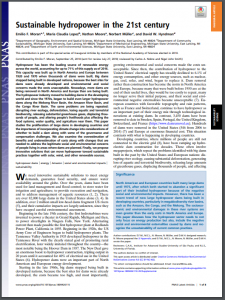Full Title: Sustainable hydropower in the 21st century
Author(s): Emilio F. Moran, Maria Claudia Lopez, Nathan Moore, Norbert Müller, and David W. Hyndman
Publisher(s): National Academy of Sciences
Publication Date: September 1, 2018
Full Text: Download Resource
Description (excerpt):
Hydropower has been the leading source of renewable energy across the world, accounting for up to 71% of this supply as of 2016. This capacity was built up in North America and Europe between 1920 and 1970 when thousands of dams were built. Big dams stopped being built in developed nations, because the best sites for dams were already developed and environmental and social concerns made the costs unacceptable. Nowadays, more dams are being removed in North America and Europe than are being built. The hydropower industry moved to building dams in the developing world and since the 1970s, began to build even larger hydropower dams along the Mekong River Basin, the Amazon River Basin, and the Congo River Basin. The same problems are being repeated: disrupting river ecology, deforestation, losing aquatic and terrestrial biodiversity, releasing substantial greenhouse gases, displacing thousands of people, and altering people’s livelihoods plus affecting the food systems, water quality, and agriculture near them. This paper studies the proliferation of large dams in developing countries and the importance of incorporating climate change into considerations of whether to build a dam along with some of the governance and compensation challenges. We also examine the overestimation of benefits and underestimation of costs along with changes that are needed to address the legitimate social and environmental concerns of people living in areas where dams are planned. Finally, we propose innovative solutions that can move hydropower toward sustainable practices together with solar, wind, and other renewable sources.
